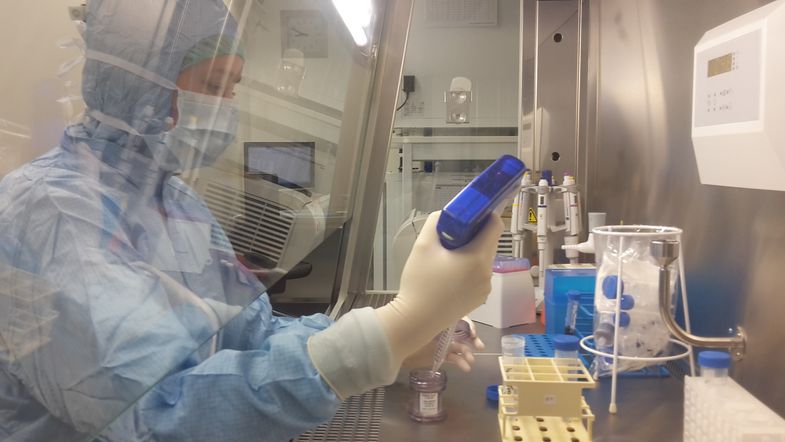“Finally, we are getting started! Together with our partners and twelve projects, we started with a kick-off meeting on November 16, 2021,” Ulrike Köhl and Ezio Bonifacio, the spokespersons for the SaxoCell Cluster, are delighted to announce.
The German Federal Ministry of Education and Research (BMBF) launched Clusters4Future to accelerate the transfer of excellent research to everyday life and to strengthen the local economy. The initiative aims to create novel industries that will have a large and sustainable impact on society in the future. Another key objective is the promotion of regional networks that will bring partners from academia and industry together.
SaxoCell is one of seven clusters from across Germany that was selected from 137 applicants in the first round of the BMBF’s Clusters4Future competition. The cluster represents a unique consortium of universities, institutes and clinics from Leipzig, Dresden and Chemnitz and has set out with the goal of strengthening not just individual or cities, but rather the entire region of Saxony. Each of the seven clusters, which also address pivotal issues such as the environment and mobility, will receive up to 15 million euros for a three-year funding period that can be extended up to nine years.
"The body has cells with excellent self-healing properties. Our task is to produce such cells with well-defined functions and a high safety profile for use in patients on an industrial scale and at a socially acceptable cost. This is a wonderful opportunity for academic research and industry to work together in Saxony," says Ezio Bonifacio, Professor at the Center for Regenerative Therapies (CRTD) and cluster spokesperson for TU Dresden.
The industry’s clinical successes to date include T-cell therapies, particularly the use of CAR-T cells, in the production if which the biotech and pharmaceutical industries have already invested here in Saxony, and the clinical testing and application of which is already being carried out by SaxoCell's partner institutes and clinics. "In the next step, we need to overcome the technological obstacles to enable broad application," explains Ulrike Köhl, Professor and Director of the Institute for Clinical Immunology at the Leipzig University and Fraunhofer IZI, as cluster spokesperson on the Leipzig side.
To surmount these obstacles across technologies, SaxoCell comprises not only research projects from the field of gene and cell therapy, but it also hosts technology platforms such as SaxoCell Systems and SaxoCell Omics. Methodological innovations and relevant infrastructures are to be bundled and further developed in these platforms. The automation of manufacturing processes is also a topic in the cluster. In addition, a variety of innovation supporting measures, such as transfer advice, contract support, professional training and regulatory expertise are intended to bring science and industry closer together in order to establish unique value chains in Saxony.
The strength in Saxony
A key strength of SaxoCell lies in the bundling of scientific and medical excellence of leading Saxon research partners, the TU Dresden, the University of Leipzig, the Fraunhofer Institute for Cell Therapy and Immunology (IZI) in Leipzig and the Chemnitz Hospital. SaxoCell's support from the Saxon state government creates an extremely attractive environment for local start-ups but also for the national and international companies to settle here. "I like to use the term 'inspiring' when describing the melting pot of SaxoCell," says Martin Bornhäuser, Professor at the University Hospital of the Medical Faculty at TU Dresden and co-spokesperson for SaxoCell in Dresden.
Innovative medicine – cell and gene therapy
SaxoCell sets a particular focus on current developments in the field of gene modification, especially of immune cells. These modified or edited cells, when equipped with specific tumor-recognizing receptors, for example, can destroy tumor and other disease-causing cells. Such chimeric antigen receptors, known as CARs, are key to the production of "living medicines" in SaxoCell's vision. CARs can redirect the immune system to almost any target. After genetic modification, either of the patient's cells or of cells that can be used for all patients (the allogeneic approach), it may theoretically become possible to provide a truly causal cure for many serious diseases for the first time.
Uwe Platzbecker, Professor at Leipzig University Hospital and co-spokesperson of SaxoCell at Leipzig University says, "Only by bringing together many different partners, is it possible to develop such highly complex novel therapeutics, with which we could hopefully truly cure patients for the first time in many different new indications."
To date, CARs have been used in T lymphocytes to treat certain blood cancers. SaxoCell will increase the flexibility of CAR-based therapies by expanding the use of CAR technology to other cell types such as NK cells, macrophages and regulatory T cells. Currently, such novel techniques can only be used to treat very rare diseases, in part due to their immense manufacturing costs. SaxoCell's main goal is to make genetically engineered cell therapeutics more affordable than before, so that they can become a standard therapy option, even globally. To this end, the cluster is also developing innovative, more cost-effective methods for the gene modification of cells and is investing in the automation and industrialization of corresponding manufacturing processes.
An industry of the future
Ultimately, SaxoCell aims to establish a broad-based and innovative cell and gene therapy industry in Saxony, where excellent research takes place and completely novel therapeutic methods are developed hand in hand with industrial partners for Germany, Europe and the world. This industry aims to produce customized cells equipped with a variety of molecular tools to fight incurable diseases. The BMBF funding will enable the realization of this vision in Saxony, the establishment of a European center for cell and gene therapy. As a bonus, this will generate beneficial regional economic effects in Saxony, including the creation of numerous highly qualified training and job opportunities in this future-oriented industry in the medium to long term.
Original article (in German): SaxoCell makes a start towards living pharmaceuticals of the future.































































